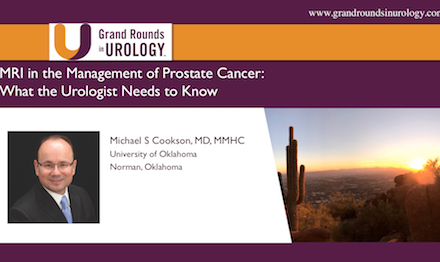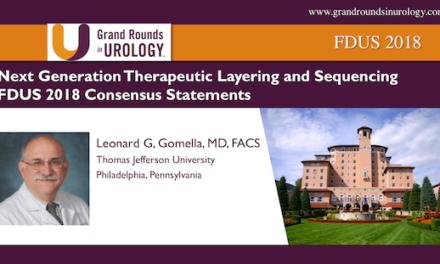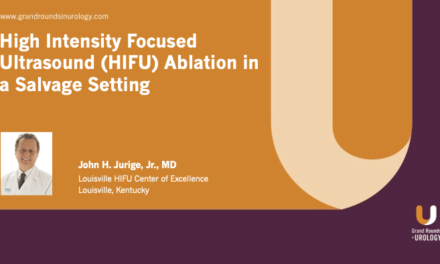Peter R. Carroll, MD, MPH, presented “Prostate Cancer Early Detection 2021” during the 31st International Prostate Cancer Update in July 2021 in Snowbird, Utah.
How to cite: Carroll, Peter R. “Prostate Cancer Early Detection 2021.” July 2021. Accessed Oct 2024. https://grandroundsinurology.com/prostate-cancer-early-detection-2021/
Prostate Cancer Early Detection 2021 – Summary
Peter R. Carroll, MD, MPH, Professor of Prostate Cancer and Urology at the University of California, San Francisco, examines data from randomized controlled trials that studied prostate-specific antigen (PSA) testing and mortality. He emphasizes that data show that the number of patients screened and diagnosed to avoid one death improves significantly over time and thus it is important to recognize the long-term impact of screening. Dr. Carroll briefly discusses American Urological Association (AUA), U.S. Preventive Services Task Force (USPSTF), American Cancer Society (ACS), and National Comprehensive Cancer Network (NCCN) recommendations, noting that some recommendations are vague with regard to biopsy. Dr. Carroll then displays a pictogram of what he calls “the Achilles heel of PSA screening.” It shows that among 1,000 men in the US, about 250 have an elevated PSA. If all patients with elevated PSA are biopsied, the results show that half have no disease and, of the remaining men, about 30-40 percent have low-risk disease. He cites harmful effects of overtreatment, mentioning sepsis as an example, but concludes that the harms outweigh the benefits in this screening paradigm. Dr. Carroll then explains that detection paradigms have changed from a “detect all, treat all” approach to a “detect some, treat some” approach, utilizing surveillance for patients with lower-risk disease. Dr. Carroll outlines NCCN Guidelines for 2021, which include a continuation of support for early detection efforts; baseline testing at age 45; germline testing; an acknowledgment that optimal screening of high-risk patients (e.g., African-American men) is not completely known; provisions for alternatives to routine biopsy; and a recognition of the value of active surveillance for low-risk cancers. He highlights the recommendation that digital rectal examination (DRE) should be used as a complement to PSA testing, not as a standalone screening test. Dr. Carroll concludes that DRE could not be implemented effectively in a nationwide screening program. Dr. Carroll explains that, increasingly, doctors are opting for tests of specificity (biomarker or MRI) before opting for biopsies. He asserts the value of using MRI before biopsy, since MRI targeting increases the detection of high-grade cancers while limiting the detection of low-grade cancers. However, he explains that a decision not to biopsy requires use of a biomarker test along with MRI, since the negative predictive value (NPV) of MRI is 85 percent. He cites the PROMIS trial and asserts that a negative MRI alone is insufficient. Dr. Carroll then cites data from a recent trial in the NEJM showing that MRI-targeted biopsy decreases the likelihood of negative or benign biopsy and testing with biomarkers can reduce biopsies by 20-65 percent while missing few (2.5-8 percent) high-grade cancers. He asserts that recent studies suggest that upfront biomarker testing with conditional MRI may be the most efficient strategy for early detection, with cost and availability being strong considerations. He supports this assertion with data on various biomarker tests as well as early detection algorithms. Dr. Carroll returns to the NCCN recommendations on management of biopsy results before concluding his discussion, reemphasizing that prostate cancer early detection in well-informed, healthy men saves lives.
About The 31st Annual International Prostate Cancer Update:
The International Prostate Cancer Update (IPCU), founded in 1990, is a multi-day CME conference focused on prostate cancer treatment updates with expert, international faculty. It is led by expert physicians and is designed for urologists, medical oncologists, radiation oncologists, and other healthcare professionals involved in the diagnosis and treatment of prostate cancer. Dr. Carroll delivered this educational activity during the 31st iteration of the meeting in July 2021 in Snowbird, Utah.
ABOUT THE AUTHOR
Dr. Peter Carroll holds the Ken and Donna Derr-Chevron Professorship in Prostate Cancer and the Taube Family Distinguished Professorship in Urology at the University of California, San Francisco (UCSF). He is also the Associate Director of Strategic Planning and Clinical Services and Program Leader of the Prostate Cancer Program at the Helen Diller Family Comprehensive Cancer Center at UCSF.
Dr. Carroll graduated with honors from Georgetown University School of Medicine. He then went on to complete general surgery training and a urology residency at UCSF, as well as a Fellowship in Urologic Oncology at Memorial Sloan Kettering Cancer Center in New York City. He has taught at the UCSF Department of Urology since 1986, and he became the department chair in 1996. Under his leadership, the department has been consistently ranked one of the top urology departments in the country by U.S. News and World Report. The department has grown, serving an increasingly larger patient population, expanding its research programs, and attracting future leaders in the field for training. Under Dr. Carroll’s leadership, the department managed an average of over $10 million in research grants that put UCSF in first place for urology funding for five consecutive years. Dr. Carroll also established the UCSF Department of Urology’s Tissue Core, a biobank of blood, urine, and residual prostate, bladder, and renal tissues for more than 6,000 consenting patients. In addition to his many accomplishments at UCSF, Dr. Carroll has authored or co-authored over 650 publications, is an active member of numerous professional medical societies, and is currently principal or co-investigator on numerous scientific studies. He is also Past-President of the American Board of Urology (2006-2008). His drive to perfect nerve-sparing prostatectomy has led to many technical innovations, and his pioneering efforts in standardizing an active surveillance regimen has led to many patients postponing radical treatment while maintaining a low risk of cancer progression.




